Speaker Bios
Corina Sas - ACM Distinguished Speaker
 Corina Sas is Professor in Human-Computer Interaction with the School of Computing and Communications at Lancaster University, UK. Her research focuses on designing and evaluating technologies for wellbeing, mental health, memory support, creative and reflective thinking in design, as well as novel tools for designing such technologies. Her work explores and integrates wearable bio sensors, mobile and lifelogging technologies with the aim to shape the interaction design and user experience.
Corina Sas is Professor in Human-Computer Interaction with the School of Computing and Communications at Lancaster University, UK. Her research focuses on designing and evaluating technologies for wellbeing, mental health, memory support, creative and reflective thinking in design, as well as novel tools for designing such technologies. Her work explores and integrates wearable bio sensors, mobile and lifelogging technologies with the aim to shape the interaction design and user experience.
Corina served as General co-Chair of the 14th and 15th ACM Creativity and Cognition Conference 2021, 2022, and of the British HCI Conference in 2007. She has also extensively served as Associate Chair for CHI and DIS, and has been Subcommittee Co-Chair for DIS. She published over 200 papers, and her work received extensive media coverage as well as 5 Best Paper and Honourable Mention Awards. She has been investigator on grants totalling over £15 million and is part of the Editorial Boards of the ACM Transactions in Human-Computer Interaction, and Taylor & Francis Human Computer Interaction journals.
Cecily Morrison
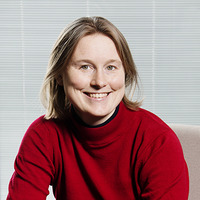 Cecily Morrison is a Sr Principal Research Manager at Microsoft Research Cambridge(opens in new tab). She leads the Teachable AI Experience team (TAI X), a multidisciplinary group who innovate new human-AI interactions to bring us to a more inclusive society. The team innovates both inclusive experiences and the machine learning that underlies them. The team is currently looking at the inclusion of people with disabilities in large multi-modal models. Cecily holds a PhD in Computer Science from University of Cambridge and an undergraduate degree in Ethnomusicology from Barnard College, Columbia University.
Cecily Morrison is a Sr Principal Research Manager at Microsoft Research Cambridge(opens in new tab). She leads the Teachable AI Experience team (TAI X), a multidisciplinary group who innovate new human-AI interactions to bring us to a more inclusive society. The team innovates both inclusive experiences and the machine learning that underlies them. The team is currently looking at the inclusion of people with disabilities in large multi-modal models. Cecily holds a PhD in Computer Science from University of Cambridge and an undergraduate degree in Ethnomusicology from Barnard College, Columbia University.
Kathrin Gerling
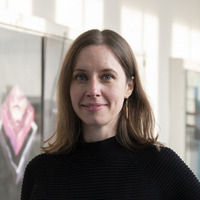 Kathrin Gerling is Professor of Human-Computer Interaction and Accessibility at the Institute for Anthropomatics und Robotics (IAR)(opens in new tab) within the Department of Informatics(opens in new tab) at Karlsruhe Institute of Technology (KIT), and head of the research group Human-Computer Interaction and Accessibility(opens in new tab). Previously, she was an Assistant Professor in the Department of Computer Science at KU Leuven, Belgium (2017-2022) and a Lecturer at the University of Lincoln, UK (2014-2017). In 2014, she received a PhD in Computer Science from the University of Saskatchewan, Canada. Central to the research of her group is the question how interactive technology can be designed in a way that supports human self-determination, and how we can achieve experiential accessibility – accessibility that strives for equitable experiences, and seeks to provide engaging user experiences for all of us. Excellence of her work and that of her team has been recognized through multiple awards, including Best Paper Awards at the leading venue in HCI, the ACM SIGCHI Conference on Human Factors in Computing Systems, and an ERC Starting Grant. She is a member of the steering committee of CHI PLAY, serves on the editorial board of PACM HCI, and is part of the SIGCHI executive committee as AC for Hybrid.
Kathrin Gerling is Professor of Human-Computer Interaction and Accessibility at the Institute for Anthropomatics und Robotics (IAR)(opens in new tab) within the Department of Informatics(opens in new tab) at Karlsruhe Institute of Technology (KIT), and head of the research group Human-Computer Interaction and Accessibility(opens in new tab). Previously, she was an Assistant Professor in the Department of Computer Science at KU Leuven, Belgium (2017-2022) and a Lecturer at the University of Lincoln, UK (2014-2017). In 2014, she received a PhD in Computer Science from the University of Saskatchewan, Canada. Central to the research of her group is the question how interactive technology can be designed in a way that supports human self-determination, and how we can achieve experiential accessibility – accessibility that strives for equitable experiences, and seeks to provide engaging user experiences for all of us. Excellence of her work and that of her team has been recognized through multiple awards, including Best Paper Awards at the leading venue in HCI, the ACM SIGCHI Conference on Human Factors in Computing Systems, and an ERC Starting Grant. She is a member of the steering committee of CHI PLAY, serves on the editorial board of PACM HCI, and is part of the SIGCHI executive committee as AC for Hybrid.
Tony Stockman
 Dr Tony Stockman has over 30 years of experience with Assistive Technology as a user, developer and evaluator of new assistive products. He has a history of active involvement in projects to support visually impaired musicians and more generally to improve accessibility for people with visual impairments. He has over 100 peer refereed publications in Human-Computer Interaction and Assistive Technology publications. He is a former president and now emeritus Board member of the International Community for Auditory displays ICAD, www.icad.org. He has served on organising committees of several international HCI conferences.
Dr Tony Stockman has over 30 years of experience with Assistive Technology as a user, developer and evaluator of new assistive products. He has a history of active involvement in projects to support visually impaired musicians and more generally to improve accessibility for people with visual impairments. He has over 100 peer refereed publications in Human-Computer Interaction and Assistive Technology publications. He is a former president and now emeritus Board member of the International Community for Auditory displays ICAD, www.icad.org. He has served on organising committees of several international HCI conferences.
Nasrine Olson
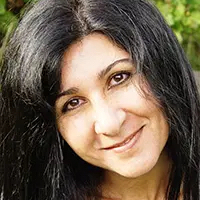 Nasrine Olson is an Associate Professor in the field of Library and Information Science at SSLIS, University of Borås, Sweden. Core research interests relate to issues of power and the relationship between day-to-day action, and broader societal structures. In the more recent years the focus has been on the societal implication of ICTs and information practices that enable or hinder the potential for equal opportunity for all. Towards this, Nasrine has adopted participatory practices in her research and has developed methodologies and technical innovations for haptic communication. She has also been instrumental in creating research environments that promote, and lead to, improved inclusive technologies and environments by coordinating projects such as EU-funded projects SUITCEYES (H2020 – 2018-2021 -- among others it included development of haptic technologies for communication with, and by, users with deafblindness) and MuseIT (HE – 2022-2025 -- among others it involves development of multisensory representation of cultural assets for broader accessibility). Nasrine is also the director of an interdisciplinary research centre called INCLUDE – Centre for Inclusive Studies, where through critical examination the ideology of normal, the unequal treatments of societal members will be explored.
Nasrine Olson is an Associate Professor in the field of Library and Information Science at SSLIS, University of Borås, Sweden. Core research interests relate to issues of power and the relationship between day-to-day action, and broader societal structures. In the more recent years the focus has been on the societal implication of ICTs and information practices that enable or hinder the potential for equal opportunity for all. Towards this, Nasrine has adopted participatory practices in her research and has developed methodologies and technical innovations for haptic communication. She has also been instrumental in creating research environments that promote, and lead to, improved inclusive technologies and environments by coordinating projects such as EU-funded projects SUITCEYES (H2020 – 2018-2021 -- among others it included development of haptic technologies for communication with, and by, users with deafblindness) and MuseIT (HE – 2022-2025 -- among others it involves development of multisensory representation of cultural assets for broader accessibility). Nasrine is also the director of an interdisciplinary research centre called INCLUDE – Centre for Inclusive Studies, where through critical examination the ideology of normal, the unequal treatments of societal members will be explored.
Raymond Holt
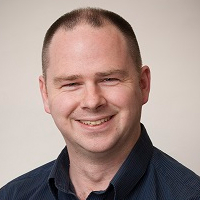 Raymond Holt is a Lecturer in Product Design in the School of Mechanical Engineering at the University of Leeds (UK), where he is a member of the Institute of Design, Robotics and Manufacture, the Immersive Cognition Lab and the Centre for Disability Studies. His core research interests are the study of haptic perception and prehension and the cocreation of assistive and rehabilitation technologies with users. He has led co-creation activities on two rehabilitation robotics projects funded by the National Institute for Health Research, and led the Leverhulme Trust-funded project Facilitating Meaningful Play for Disabled Children through Participatory Design. He has recently been part of the European Commission funded project SUITCEYES, where he led activities on the sensing and navigation elements, and is currently extending this work as part of the Wellcome Trust-funded Imagining Technologies for Disability Futures project.
Raymond Holt is a Lecturer in Product Design in the School of Mechanical Engineering at the University of Leeds (UK), where he is a member of the Institute of Design, Robotics and Manufacture, the Immersive Cognition Lab and the Centre for Disability Studies. His core research interests are the study of haptic perception and prehension and the cocreation of assistive and rehabilitation technologies with users. He has led co-creation activities on two rehabilitation robotics projects funded by the National Institute for Health Research, and led the Leverhulme Trust-funded project Facilitating Meaningful Play for Disabled Children through Participatory Design. He has recently been part of the European Commission funded project SUITCEYES, where he led activities on the sensing and navigation elements, and is currently extending this work as part of the Wellcome Trust-funded Imagining Technologies for Disability Futures project.
Stavroula Ntoa
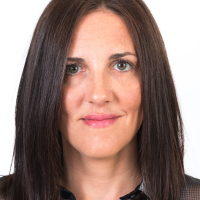 Stavroula Ntoa is a computer scientist specialised in Design for All, software accessibility, usability engineering, User Experience (UX) research and design. Currently, she is a post-doctoral researcher at the Human-Computer Interaction (HCI) Laboratory of the Institute of Computer Science of the Foundation for Research and Technology - Hellas (ICS-FORTH). She is experienced in the design, development and evaluation of assistive technology software for users with disabilities and accessible software applications. She has expertise in UX design and evaluation of several projects in various contexts and application domains, including responsive web, big data, games, mobile, extended reality, as well as intelligent and AI applications. Her research interests focus on Design for All and Universal Access of modern interactive technologies, adaptive and intelligent interfaces, as well as inclusiveness and user experience research in intelligent and Artificial Intelligence environments. She serves as an editorial board member to the Universal Access in the Information Society International Journal, the International Journal of Human-Computer Interaction, and the Frontiers in Virtual Reality Journal, and guest editor for special issues of international journals.
Stavroula Ntoa is a computer scientist specialised in Design for All, software accessibility, usability engineering, User Experience (UX) research and design. Currently, she is a post-doctoral researcher at the Human-Computer Interaction (HCI) Laboratory of the Institute of Computer Science of the Foundation for Research and Technology - Hellas (ICS-FORTH). She is experienced in the design, development and evaluation of assistive technology software for users with disabilities and accessible software applications. She has expertise in UX design and evaluation of several projects in various contexts and application domains, including responsive web, big data, games, mobile, extended reality, as well as intelligent and AI applications. Her research interests focus on Design for All and Universal Access of modern interactive technologies, adaptive and intelligent interfaces, as well as inclusiveness and user experience research in intelligent and Artificial Intelligence environments. She serves as an editorial board member to the Universal Access in the Information Society International Journal, the International Journal of Human-Computer Interaction, and the Frontiers in Virtual Reality Journal, and guest editor for special issues of international journals.
Colette Jeffrey
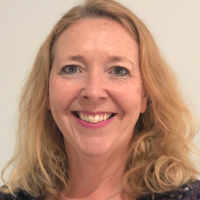 Dr Colette Jeffrey is Associate Professor of Wayfinding and Inclusive Design at Birmingham City University. Colette was appointed Fellow of the Royal Institute of Navigation (RIN) in 2022 in recognition of her contributions to the design of inclusive human navigation systems, and research on navigator cognition and is currently a RIN Council Member and Trustee. She has designed wayfinding strategies and systems for over 25 NHS hospitals, the Natural History Museum in London, Tower Bridge, Wembley Arena, Heathrow Airport and shopping centres in Dublin and Dubai. Colette teaches graphic design, inclusive design and wayfinding at BCU and for 4 years was academic lead at Birmingham Institute of Fashion and Creative Arts (BIFCA) in Wuhan China.
Dr Colette Jeffrey is Associate Professor of Wayfinding and Inclusive Design at Birmingham City University. Colette was appointed Fellow of the Royal Institute of Navigation (RIN) in 2022 in recognition of her contributions to the design of inclusive human navigation systems, and research on navigator cognition and is currently a RIN Council Member and Trustee. She has designed wayfinding strategies and systems for over 25 NHS hospitals, the Natural History Museum in London, Tower Bridge, Wembley Arena, Heathrow Airport and shopping centres in Dublin and Dubai. Colette teaches graphic design, inclusive design and wayfinding at BCU and for 4 years was academic lead at Birmingham Institute of Fashion and Creative Arts (BIFCA) in Wuhan China.
George Margetis
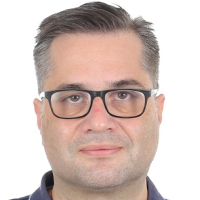 Dr George Margetis is a computer scientist specialising in interaction design, human-centred Artificial Intelligence, X-Reality and Universal Access. Currently, he is a Post-Doctoral Researcher with the Human-Computer Interaction Laboratory of the Institute of Computer Science (ICS) of the Foundation for Research and Technology Hellas (FORTH). His current research focuses on interaction methods and tools, Intelligent User Interfaces and Human-Centered Decision Support Systems, natural interaction in Intelligent Environments, and Design for All. He has been actively involved in several European, National and industry-funded projects in the above areas, serving as the Scientific and Technical manager in many of them. He has co-authored more than 90 scientific peer-reviewed publications, including book chapters, articles in journals and proceedings of international conferences and workshops. He is a member of the Program Committee and Paper Review Committee in various international journals, conferences and workshops. He is also co-chairing the 5th International Conference on Human-Centered Design, Operation and Evaluation of Mobile Communications, jointly held with HCI International 2024.
Dr George Margetis is a computer scientist specialising in interaction design, human-centred Artificial Intelligence, X-Reality and Universal Access. Currently, he is a Post-Doctoral Researcher with the Human-Computer Interaction Laboratory of the Institute of Computer Science (ICS) of the Foundation for Research and Technology Hellas (FORTH). His current research focuses on interaction methods and tools, Intelligent User Interfaces and Human-Centered Decision Support Systems, natural interaction in Intelligent Environments, and Design for All. He has been actively involved in several European, National and industry-funded projects in the above areas, serving as the Scientific and Technical manager in many of them. He has co-authored more than 90 scientific peer-reviewed publications, including book chapters, articles in journals and proceedings of international conferences and workshops. He is a member of the Program Committee and Paper Review Committee in various international journals, conferences and workshops. He is also co-chairing the 5th International Conference on Human-Centered Design, Operation and Evaluation of Mobile Communications, jointly held with HCI International 2024.
Jacob Holden
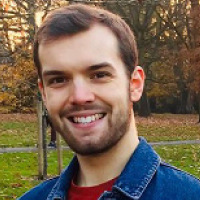 Jacob is an occupational therapist who works at SpecialEffect. He helps provide individuals with a physical disability access to video games through means of specialised equipment, such as controllers, switches and joysticks, as well as assist developers with making their games more accessible from a motor perspective. Jacob is also part of the EyeGaze Games team. Collaborating with Sun and Moon Studios, he’s helping to make browser games accessible by several access methods, including Eyegaze, switches, and joysticks.
Jacob is an occupational therapist who works at SpecialEffect. He helps provide individuals with a physical disability access to video games through means of specialised equipment, such as controllers, switches and joysticks, as well as assist developers with making their games more accessible from a motor perspective. Jacob is also part of the EyeGaze Games team. Collaborating with Sun and Moon Studios, he’s helping to make browser games accessible by several access methods, including Eyegaze, switches, and joysticks.
Harry Nelson
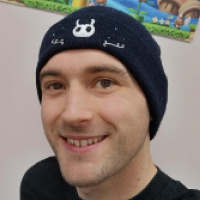 Harry, a Technical Specialist for the charity SpecialEffect, has years of experience working directly with individuals experiencing motor difficulties. Specialising in accessible game and software design, his experience encompasses knowledge of eye-controlled technology, alongside hardware developments such as adaptive controllers. Harry works as part of SpecialEffect’s Service Delivery team in giving feedback and introducing helpful resources to developers to aid them in making their games more accessible.
Harry, a Technical Specialist for the charity SpecialEffect, has years of experience working directly with individuals experiencing motor difficulties. Specialising in accessible game and software design, his experience encompasses knowledge of eye-controlled technology, alongside hardware developments such as adaptive controllers. Harry works as part of SpecialEffect’s Service Delivery team in giving feedback and introducing helpful resources to developers to aid them in making their games more accessible.
Sachin Sunil
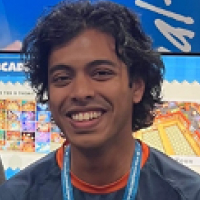 Sachin is an Occupational Therapist working for the charity, SpecialEffect, for their StarGaze project, providing assessment and support for people in intensive care following a traumatic injury or illness resulting in severe and complex physical challenges. These individuals can then use AAC or access a computer using various access methods. Sachin works directly with patients and medical staff in a range of settings to provide ongoing support for adapting these setups as their needs change over time. Sachin has helped with creating an eye gaze accessible interface for controlling a drivable videoconferencing robot called “Double 3” that works with AAC devices so people with severe physical difficulties can independently explore and communicate in a variety of venues using just their eye movements. Sachin is also part of the team making “EyeGaze Games”, in partnership with "Sun and Moon Studios" and "Moon Interactive"; these are free browser games that people can control using a range of access methods including eye gaze, joysticks, gamepads, switches and touch. Sachin is helping with the release of these accessible games for iOS and Android systems coming later this year.
Sachin is an Occupational Therapist working for the charity, SpecialEffect, for their StarGaze project, providing assessment and support for people in intensive care following a traumatic injury or illness resulting in severe and complex physical challenges. These individuals can then use AAC or access a computer using various access methods. Sachin works directly with patients and medical staff in a range of settings to provide ongoing support for adapting these setups as their needs change over time. Sachin has helped with creating an eye gaze accessible interface for controlling a drivable videoconferencing robot called “Double 3” that works with AAC devices so people with severe physical difficulties can independently explore and communicate in a variety of venues using just their eye movements. Sachin is also part of the team making “EyeGaze Games”, in partnership with "Sun and Moon Studios" and "Moon Interactive"; these are free browser games that people can control using a range of access methods including eye gaze, joysticks, gamepads, switches and touch. Sachin is helping with the release of these accessible games for iOS and Android systems coming later this year.
Simone Stumpf
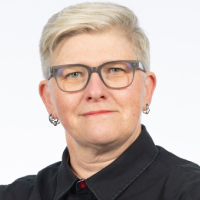 Dr Simone Stumpf is a Reader in Responsible and Interactive AI at the School of Computing Science at University of Glasgow. She has a long-standing research focus on user interactions with machine learning systems. Her research includes self-management systems for people living with long-term conditions, developing teachable object recognisers for people who are blind or have low vision, and investigating AI fairness. Her work has contributed to shaping the field of Explainable AI (XAI) through the Explanatory Debugging approach for interactive machine learning, providing design principles for enabling better human-computer interaction and investigating the effects of greater transparency. The prime aim of her work is to empower all users to use intelligent systems effectively.
Dr Simone Stumpf is a Reader in Responsible and Interactive AI at the School of Computing Science at University of Glasgow. She has a long-standing research focus on user interactions with machine learning systems. Her research includes self-management systems for people living with long-term conditions, developing teachable object recognisers for people who are blind or have low vision, and investigating AI fairness. Her work has contributed to shaping the field of Explainable AI (XAI) through the Explanatory Debugging approach for interactive machine learning, providing design principles for enabling better human-computer interaction and investigating the effects of greater transparency. The prime aim of her work is to empower all users to use intelligent systems effectively.
Emilie Giles
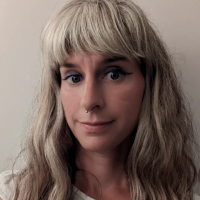 Dr Emilie Giles is an researcher, artist and educator, her work focusing on creative technology linked with accessibility and empowerment. She holds a Ph.D. from The Open University exploring how e-textiles can be used by blind and visually impaired makers to create personal interactive art pieces, using participatory and co-designing approaches. Along with her research activities Emilie is a Senior Lecturer at Arts University Bournemouth on BA Graphic Design where she teaches students an array of creative technology processes including programming micro-controllers such as Arduino, soft electronics such as conductive paint or silver thread circuits along with approaches such as participatory practice or speculative design. Emilie’s background is rooted in teaching people how to build their own creative technology projects, having been Co-director and Head of Outreach and Participation at Codasign, co-organiser for MzTEK and a lead tutor for Technology Will Save Us. Project collaborators have included museums and galleries such as the Victoria and Albert Museum and Tate Britain, along with smaller partners such as GIANT, MK Gallery and the Watford Museum.
Dr Emilie Giles is an researcher, artist and educator, her work focusing on creative technology linked with accessibility and empowerment. She holds a Ph.D. from The Open University exploring how e-textiles can be used by blind and visually impaired makers to create personal interactive art pieces, using participatory and co-designing approaches. Along with her research activities Emilie is a Senior Lecturer at Arts University Bournemouth on BA Graphic Design where she teaches students an array of creative technology processes including programming micro-controllers such as Arduino, soft electronics such as conductive paint or silver thread circuits along with approaches such as participatory practice or speculative design. Emilie’s background is rooted in teaching people how to build their own creative technology projects, having been Co-director and Head of Outreach and Participation at Codasign, co-organiser for MzTEK and a lead tutor for Technology Will Save Us. Project collaborators have included museums and galleries such as the Victoria and Albert Museum and Tate Britain, along with smaller partners such as GIANT, MK Gallery and the Watford Museum.
Kimberly Mai
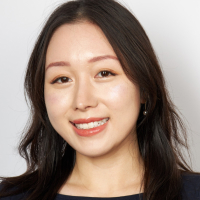 Kimberly Mai is a Principal Technology Adviser in AI Compliance at the Information Commissioner’s Office and a PhD researcher at University College London. Her PhD research on how humans cannot reliably detect speech deepfakes was featured in international news outlets including the BBC, New Scientist, and The Guardian. Kimberly holds a bachelor’s degree in mathematics and economics from the London School of Economics and a master’s degree in data science and machine learning from University College London. Her research interests include anomaly detection, data protection, and AI governance.
Kimberly Mai is a Principal Technology Adviser in AI Compliance at the Information Commissioner’s Office and a PhD researcher at University College London. Her PhD research on how humans cannot reliably detect speech deepfakes was featured in international news outlets including the BBC, New Scientist, and The Guardian. Kimberly holds a bachelor’s degree in mathematics and economics from the London School of Economics and a master’s degree in data science and machine learning from University College London. Her research interests include anomaly detection, data protection, and AI governance.
Franziska Schroeder
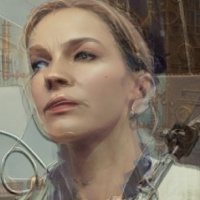 Franziska Schroeder is an improviser and a Professor of Music and Cultures at SARC: Centre for interdisciplinary research in sound and music, Queen’s University Belfast. At Queen’s she leads the Performance without Barriers research group, a collaboration with Drake Music NI, which, for over ten years, has dedicated itself to exploring the role of technology in removing access barriers encountered by some disabled musicians in producing creative outputs.
Franziska Schroeder is an improviser and a Professor of Music and Cultures at SARC: Centre for interdisciplinary research in sound and music, Queen’s University Belfast. At Queen’s she leads the Performance without Barriers research group, a collaboration with Drake Music NI, which, for over ten years, has dedicated itself to exploring the role of technology in removing access barriers encountered by some disabled musicians in producing creative outputs.
Alex Lucas
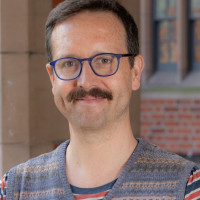 Alex Lucas is a Product Designer turned academic who specialises in designing music technology hardware interfaces. Commercial products designed by Alex include the Novation Peak polyphonic synthesiser and Circuit Mono Station sequenced monosynth. Alex has a passion for intuitive user experience and aspires to improve the accessibility of music technology interfaces. He is now the post-doctoral lead on the AHRC project “Bridging the Gap”.
Alex Lucas is a Product Designer turned academic who specialises in designing music technology hardware interfaces. Commercial products designed by Alex include the Novation Peak polyphonic synthesiser and Circuit Mono Station sequenced monosynth. Alex has a passion for intuitive user experience and aspires to improve the accessibility of music technology interfaces. He is now the post-doctoral lead on the AHRC project “Bridging the Gap”.
Rohan Slaughter
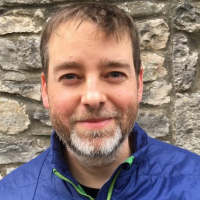 Rohan Slaughter has an Assistive Technology, IT and education management background. Rohan joined the University of Dundee as a senior lecturer in Assistive Technology in late 2020. This role was created to support the development of the MSc in Educational Assistive Technology (EduAT). Rohan worked for the first part of his career at Beaumont College, a Specialist College where he was employed as Assistant Principal and Head of Technology. Rohan worked in a consulting role at Jisc, the national EdTech charity, prior to joining the University. Rohan is developing interdisciplinary research interests that are practically focussed and aim to support evidence-based policy making in Assistive Technology and allied areas. The aim of this work is to provide evidence to policy and decision makers that elucidates the value of investing in assistive technology training at all levels, dedicated AT roles in organisations, and the development of national AT support services to the benefit of the users of assistive technology and those who support them.
Rohan Slaughter has an Assistive Technology, IT and education management background. Rohan joined the University of Dundee as a senior lecturer in Assistive Technology in late 2020. This role was created to support the development of the MSc in Educational Assistive Technology (EduAT). Rohan worked for the first part of his career at Beaumont College, a Specialist College where he was employed as Assistant Principal and Head of Technology. Rohan worked in a consulting role at Jisc, the national EdTech charity, prior to joining the University. Rohan is developing interdisciplinary research interests that are practically focussed and aim to support evidence-based policy making in Assistive Technology and allied areas. The aim of this work is to provide evidence to policy and decision makers that elucidates the value of investing in assistive technology training at all levels, dedicated AT roles in organisations, and the development of national AT support services to the benefit of the users of assistive technology and those who support them.
Cathy Holloway
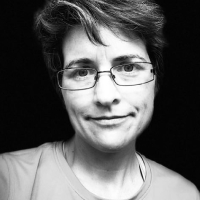 Cathy is a Professor of Interaction Design and Innovation at UCL’s Interaction Centre (UCLIC); Cathy is also the co-founder and academic director of the Global Disability Innovation Hub (GDI Hub). She leads a team dedicated to designing accessible and assistive technologies and conducting empirical research on their impact. This spans multiple domains from population health to the development of technologies and the creation of innovation programmes globally, for example, assistive technology accelerators in Kenya and India and an impact fund. Cathy and her team were awarded WHO Collaborating Centre status for their work on Assistive Technology. The team are working to understand how AI can create more inclusive experiences for disabled people globally, including in humanitarian settings, whilst also developing novel technologies and researching grassroots innovation ecosystems.
Cathy is a Professor of Interaction Design and Innovation at UCL’s Interaction Centre (UCLIC); Cathy is also the co-founder and academic director of the Global Disability Innovation Hub (GDI Hub). She leads a team dedicated to designing accessible and assistive technologies and conducting empirical research on their impact. This spans multiple domains from population health to the development of technologies and the creation of innovation programmes globally, for example, assistive technology accelerators in Kenya and India and an impact fund. Cathy and her team were awarded WHO Collaborating Centre status for their work on Assistive Technology. The team are working to understand how AI can create more inclusive experiences for disabled people globally, including in humanitarian settings, whilst also developing novel technologies and researching grassroots innovation ecosystems.
Paul Cairns
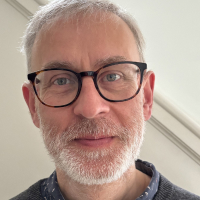 Paul Cairns is Professor of Human-Computer Interaction at the University of York and currently head of the Computer Science department there as well. He has worked extensively in investigating and measuring people's experiences of playing digital games. This led him to working with Prof. Chris Power (UPEI), Dr Jen Beeston (also at York) and The AbleGamers Foundation to better understand the experiences of people with disabilities when playing digital games. As part of this work, they have developed the Accessible Player Experiences (APX) pattern language and a course based on this to educate game developers about making their games mores accessible. So far, through AbleGamers, over 200 developers have been accredited in APX. Outside of research, Paul likes to crochet characters from games. Nowadays, he likes playing Rounds (Landfall, 2021) with his son, and he even wins sometimes.
Paul Cairns is Professor of Human-Computer Interaction at the University of York and currently head of the Computer Science department there as well. He has worked extensively in investigating and measuring people's experiences of playing digital games. This led him to working with Prof. Chris Power (UPEI), Dr Jen Beeston (also at York) and The AbleGamers Foundation to better understand the experiences of people with disabilities when playing digital games. As part of this work, they have developed the Accessible Player Experiences (APX) pattern language and a course based on this to educate game developers about making their games mores accessible. So far, through AbleGamers, over 200 developers have been accredited in APX. Outside of research, Paul likes to crochet characters from games. Nowadays, he likes playing Rounds (Landfall, 2021) with his son, and he even wins sometimes.
Michelle McCormack
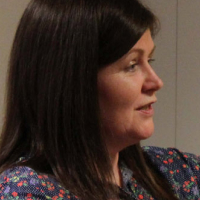 Michelle started Drake Music NI in 1992, on her return home in her final write-up stages of a PhD in Systems Design and analysis from City University London. Having completed an honours degree in music in University of Ulster and a Master's in Music Technology at York University, she created the first weekly workshop delivery in assistive technology creativity across the island of Ireland. With a passion for inclusion, equality and believing that everyone has the right to literally have their voice heard, Michelle has spent 30 years at the forefront of inclusive practice in Northern Ireland, as a fundraiser, a researcher and designer, a trainer and also a practitioner.
Michelle started Drake Music NI in 1992, on her return home in her final write-up stages of a PhD in Systems Design and analysis from City University London. Having completed an honours degree in music in University of Ulster and a Master's in Music Technology at York University, she created the first weekly workshop delivery in assistive technology creativity across the island of Ireland. With a passion for inclusion, equality and believing that everyone has the right to literally have their voice heard, Michelle has spent 30 years at the forefront of inclusive practice in Northern Ireland, as a fundraiser, a researcher and designer, a trainer and also a practitioner.
Reflex Arc
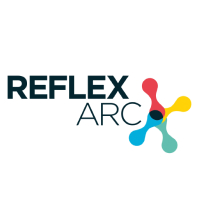 Reflex Arc are award-winning, BAFTA-nominated immersive technology producers with focused experience designing for, about, and with exceptional audiences, namely the blind, partially sighted, and hard of hearing. Throughout their almost 15 years specialising in projects utilising VR/XR and motion detection technologies, they have been fortunate to work on a broad range of accessibility-related projects, collaborating with organisations such as the Guide Dogs for the Blind Association, HSBC's Digital Accessibility Department, and Sky Television.
Reflex Arc are award-winning, BAFTA-nominated immersive technology producers with focused experience designing for, about, and with exceptional audiences, namely the blind, partially sighted, and hard of hearing. Throughout their almost 15 years specialising in projects utilising VR/XR and motion detection technologies, they have been fortunate to work on a broad range of accessibility-related projects, collaborating with organisations such as the Guide Dogs for the Blind Association, HSBC's Digital Accessibility Department, and Sky Television.
Elizabeth J. Birch
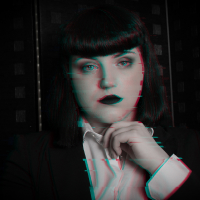 Elizabeth J. Birch is an undefined glitch, known for blurring the boundaries and striving for innovative ways to envision and make music. An award-winning musician, she combines synthesisers, haunting vocals, and ordinary everyday objects to challenge what music is, how it’s made and who musicians are. Elizabeth was featured as one of the Mastercard Music Trailblazers ahead of the 2024 BRIT awards, recognised as an artist driving positive change in the music industry across technology, diversity and inclusion, helping make music more inclusive for all. A producer, composer, vocalist, and tech-enthusiast, her second EP ‘Kenopsia' released in 2023 explored challenging subjects such as loss and grief, and received radio support from BBC Introducing, Unmade Radio and Black Country Radio. She won the ‘Inspirational Music Leader’ award from Youth Music in 2023 for her inclusive community music and facilitation workshops, focused around songwriting, technology and youth voice.
Elizabeth J. Birch is an undefined glitch, known for blurring the boundaries and striving for innovative ways to envision and make music. An award-winning musician, she combines synthesisers, haunting vocals, and ordinary everyday objects to challenge what music is, how it’s made and who musicians are. Elizabeth was featured as one of the Mastercard Music Trailblazers ahead of the 2024 BRIT awards, recognised as an artist driving positive change in the music industry across technology, diversity and inclusion, helping make music more inclusive for all. A producer, composer, vocalist, and tech-enthusiast, her second EP ‘Kenopsia' released in 2023 explored challenging subjects such as loss and grief, and received radio support from BBC Introducing, Unmade Radio and Black Country Radio. She won the ‘Inspirational Music Leader’ award from Youth Music in 2023 for her inclusive community music and facilitation workshops, focused around songwriting, technology and youth voice.
Denis Newman-Griffis
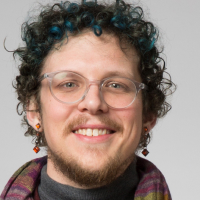 Denis Newman-Griffis (they/them) is a Lecturer in Data Science in the University of Sheffield Information School, a Research Fellow of the Research on Research Institute, and Co-Chair of the UK Young Academy. Their work investigates principles and practices of responsible data science and AI, with a particular focus on healthcare and disability. They are leading funded projects on responsible AI in research funding and in organisational practice across public and private sectors. Denis’ work on NLP for information on human function and disability was recognised with the American Medical Informatics Association’s Doctoral Dissertation Award. Denis is a proudly queer and neurodivergent academic and committed to fostering diversity of identity, perspective, and experience around the AI table.
Denis Newman-Griffis (they/them) is a Lecturer in Data Science in the University of Sheffield Information School, a Research Fellow of the Research on Research Institute, and Co-Chair of the UK Young Academy. Their work investigates principles and practices of responsible data science and AI, with a particular focus on healthcare and disability. They are leading funded projects on responsible AI in research funding and in organisational practice across public and private sectors. Denis’ work on NLP for information on human function and disability was recognised with the American Medical Informatics Association’s Doctoral Dissertation Award. Denis is a proudly queer and neurodivergent academic and committed to fostering diversity of identity, perspective, and experience around the AI table.
More to be announced



